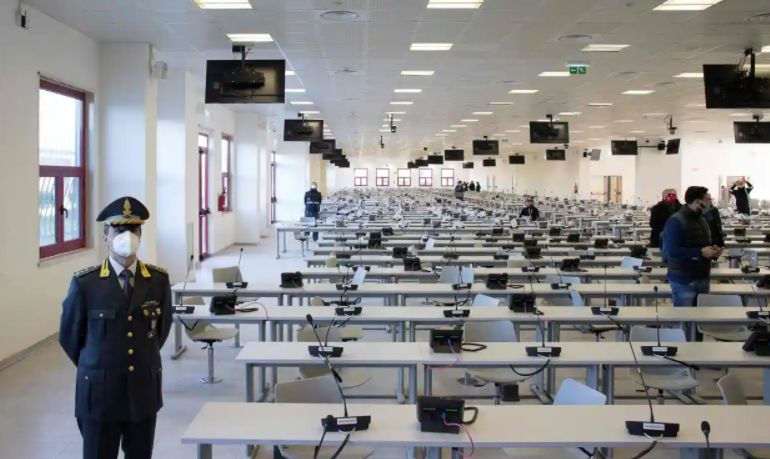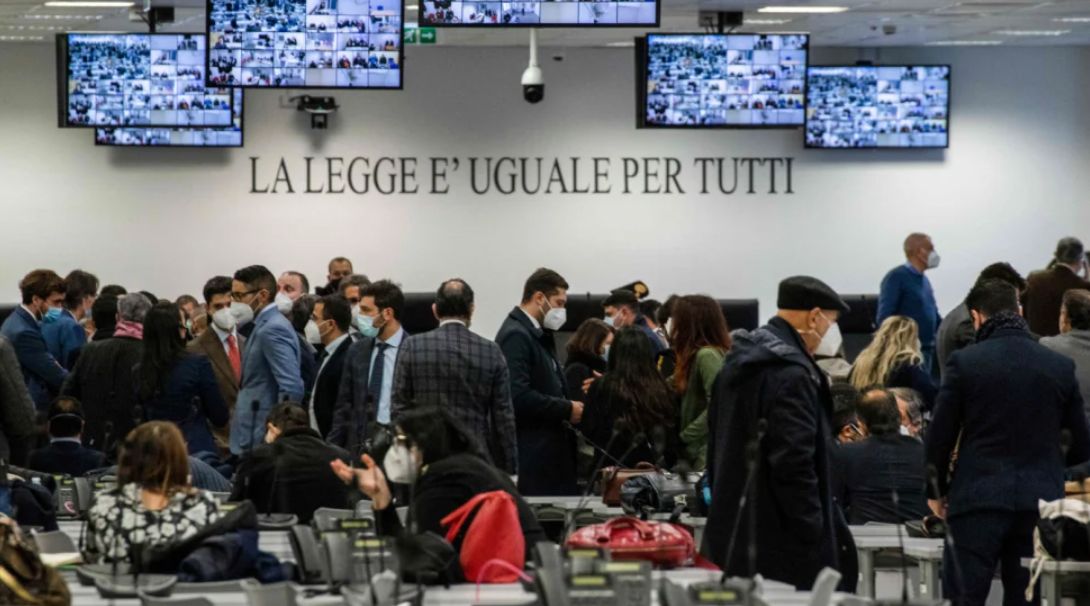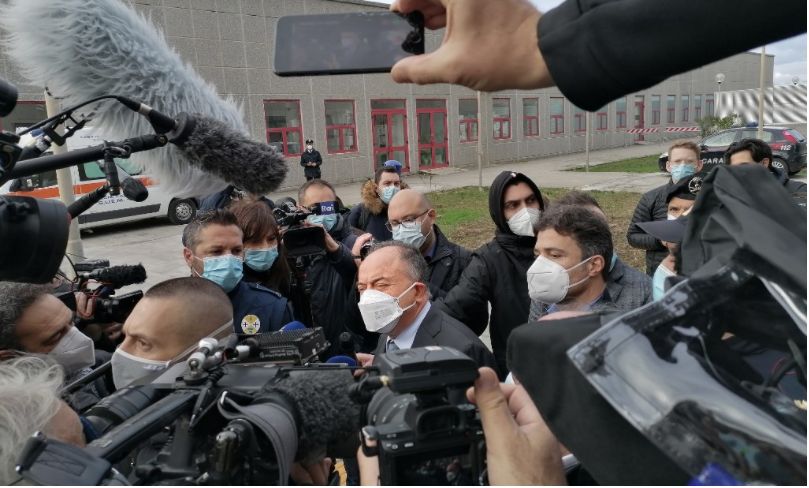High-security
1,000-capacity courtroom has been built in Calabria, with cages to hold the
defendants

"The law is
equal for all" reads the title in Lamenzia
where Italy's biggest mafia trial in decades will start tomorrow, with
more than 300 defendants linked to the powerful crime group, the 'Ndrangheta,
to appear amid high security.

But there is an odd
aspect to this, Freemasonry. For example, the investigation conducted by
prosecutor Nicola Gratteri revealed a mixture of
'Ndrangheta, politics, and
Freemasonry.
The National
Anti-Mafia and Counter-Terrorism Directorate (DNAA) affirmed the enormous
interest of Cosa Nostra and 'Ndrangheta linked to Freemasonry,
indicating 193 subjects with double membership of which 122
from the Grand Orient of Italy; 58 to the GLRI, 9 to the GLI and 4 to the
Serenissima.

Calabria, the region
in the ‘toe’ of the Italian ‘boot’, is home to the Ndrangheta. Of all
the world’s gangster fraternities, the Ndrangheta has
the best claim to being global: it has colonies in northern Italy, northern
Europe, North America, and Australia. Regional and local government has been
beset for decades by organized criminal influence, and the dilapidated rural
communities of Calabria are home to some of Europe’s biggest drug traffickers.
The Ndrangheta is no mediocre mafia.
In October 2011, in a
farm building in one of those rural communities, police listening devices
recorded the local ’ndrangheta boss, Pantaleone ‘Uncle Luni’ Mancuso: ‘The ’ndrangheta doesn’t
exist anymore! … The ’ndrangheta is part of
Freemasonry … let’s say, it’s under Freemasonry. But they’ve got the same rules
and stuff … Once upon a time the ’ndrangheta belonged
to the rich folk! After, they left it to Giuliano Di Bernardo, the university
professor who, between 1990 and 1993, was the Grand Master of Italy’s biggest
and most prestigious Masonic order, the Grand Orient. In June 2019, speaking
through the beard that makes him resemble an Armani-suited Karl Marx, Di
Bernardo testified before a Calabrian court. He recalled his shock when, as
Grand Master, he looked into the state of Masonry in Calabria: ‘I discovered
that twenty-eight of thirty-two Lodges were governed by the ’ndrangheta.
So at that moment, I decided to leave the Grand Orient.’
Calabria has provided
plenty of fuel for conspiracist newspaper headlines that are as confusing as
they are inflammatory – along the following lines: ‘Mafia boss says,
“Freemasons run the ’ndrangheta!’” ‘Former Grand
Master confesses, “The ’ndrangheta runs the
Freemasons!”’ On 1 March 2017, on the orders of the permanent Parliamentary
Commission of Inquiry into the Mafia, police mounted dawn raids on the offices
of the four biggest Masonic orders, and confiscated membership lists. Their
search concentrated on Freemasonry in Calabria and Sicily, Italy’s most
notorious mafia hotbeds.
The raids by the
Parliamentary Commission of Inquiry brought back Masons’ memories of similar
raids twenty-five years earlier. At that time, a sprawling criminal
investigation had sought to map hundreds of criminal and wheeler-dealer
networks over the impossible tangle of different Masonic orders, Lodges, and
rites – both regular and irregular, open and covert. In 1993, the confiscated
membership lists were leaked, and Italy’s Freemasons were named in many
newspapers. Some Brothers reported receiving anonymous threats in the
aftermath; others said they were cold-shouldered by friends. (Strangely, the
lists in the press excluded all but a tiny number of the women Masons from
mixed orders.) Eventually, in 2000, a court in Rome halted the investigation,
declaring that it owed more to the ‘collective imaginary’ about Freemasonry
than it did to any evidence that Freemasons were infiltrating the public
institutions for illicit ends. Many dismissed this ruling as a cover-up. Masons
were left bitter.
Given this history,
in 2017 there was a complete breakdown in trust between the members of the
Parliamentary Commission of Inquiry and the Masonic leadership. The
Commission’s report accused the chief Masons of being in denial about mafia
infiltration, and of being ‘far from transparent and cooperative’: all four
Grand Masters had refused to hand over their membership lists. Soon afterward,
the Grand Master of the Grand Orient published a pamphlet that compared the
Parliamentary Commission to the Inquisition. (As coincidence would have it, the
Commission’s hearings are held in the same Roman palazzo where Galileo was
forced to recant his scientific findings.)
Yet there is a strong
sense that the Freemasonry’s dispute with the Commission of Inquiry was fueled
by political grandstanding from both sides. It is worth remembering that the
most senior Masons are elected: they are the Prime Ministers and Presidents of
their little democracies. Denouncing anti-Masonic prejudice and evoking the
memory of Masonic martyrs have always been rallying cries among the Brethren,
and thus a useful electoral gambit. On the other side, it would have taken a
strong-willed parliamentarian on the Commission of Inquiry to face up to the
public animosity towards the Craft. In February 2017, for example, Italy’s
leading current affairs magazine carried the front-page headline, ‘Let’s
abolish Freemasonry’. The populist Five-Star Movement, which came to power in
June 2018, has a policy of expelling Freemasons from its ranks, and Masons are
often listed among its ‘establishment’ enemies.
The Ndrangheta is a curious organization, having more than
twice as many members as Sicily’s Cosa Nostra, and a much more complicated
structure: for example, each stage in the career ladder of an Ndrangheta is marked by a new rank with its own
elaborate initiation ritual. The Calabria mafia is an underworld mirror of the
Craft, which blends local autonomy for the Lodges with national and
international ‘brand’ control. What we could call the Ndrangheta brand
or franchise, meaning its rules, ranks, and rituals, are all centrally
controlled by a body called il Crimine (‘the
Crime’). Even when they are based outside Calabria, ’ndranghetisti seek
authorization from the Crime to set up new cells. But the Ndrangheta is also decentralized, in that its
individual clans and cells pursue all kinds of criminal activities at their own
initiative. Nobody is answerable to the Crime when they smuggle in a shipment
of drugs, for example.
Things began to shift
in the 1970s when the Ndrangheta grew
vastly richer on the profits of kidnapping, narcotics, and infiltrating public
works contracts. As the money flowed in, the criminal brotherhood’s structure
evolved: unbeknownst to the mass of the membership, ever more upper ranks were
invented. By creating them, most senior bosses were trying to monopolize access
to the money derived from infiltrating public works, and keep the peace among
themselves while they did so. But they could never settle on a definitive
formula, just as at various times in the history of Freemasonry, there was
runaway inflation in the number of Degrees and rituals, and a fight over who
got to authorize them. Such internal wrangles were one of the reasons behind
savage Ndrangheta civil wars in the 1970s
and 1980s. In the end, around 2001, an alliance of the most powerful bosses
founded an entirely separate and highly secretive group within the Ndrangheta, so investigators believe. The group’s members
include men with the kind of white-collar, political skills needed to get on
with brokering corrupt deals with business and the state, while the crime
bosses were left free to use their own less specialized skills to best effect.
A few bosses who knew about this group have been bugged using various names to
describe it: ‘the invisible ones’, for example. And because, like everyone
else, Calabrian gangsters love to think of the Freemasons as the last word in
occult power, they also refer to the new group, according to one supergrass, as ‘something analogous to Freemasonry’.
That is what
the Ndrangheta boss Pantaleone ‘Uncle Luni’ Mancuso was doing when he was recorded in 2011 saying
that the Freemasons had taken over the Ndrangheta.
He was using a metaphor, as almost no one pointed out when Uncle Luni’s words were splashed over the newspapers.
But now is not the
time for the Freemasons of Italy to shout their outrage at the way their
reputation has been attacked because of a mere metaphor. The Gotha Trial may
yet hold damning surprises in store. It is also crucial to understand that
when Ndrangheta refers to Freemasonry they
are not just speaking in metaphor. Masonic Lodges, real Masonic Lodges, are
part of the Calabrian mafia’s pervasive networking system.
Here is how the
judges think it all works. The Ndrangheta loves
to get its hands on state contracts for collecting and disposing of rubbish,
building and maintaining roads and hospitals, and so on. ’Ndranghetisti use
mediators to wheedle their way into winning these contracts: politicians,
administrators, entrepreneurs, and lawyers. Indeed, mafia organizations are
only as strong as the mediators they can call on; they have a constant hunger
to co-opt new ones, and will use any mix of bribery, blackmail, and
intimidation to do so. This is where Masonic Lodges fit in.
Especially since
the P2 scandal, Freemasonry has attracted unscrupulous men from
the same kind of professional background as the honest Masons. Many of the
unscrupulous new arrivals get bored and go elsewhere when they realize what
honest Masons actually do. But within the confused world of Calabrian
Freemasonry, there are plenty of niches where clusters of them can find a base.
Most of the Lodges cited in the judges’ ruling in the Gotha Trial are the kind
of ‘covert’ or ‘irregular’ Lodges not authorized by the main national orders. They
act like dating agencies, matching ’Ndranghetisti to
mediators from among the professional classes, and can offer a route to the
very top of the grey zone where the criminal underworld meets the upper world
of politics and business. But regular Lodges are at risk too: by accepting a
banal favor from a Brother secretly in league with the ’Ndranghetisti ,
even an honest Mason can be drawn into a web of blackmail.
If the ruling of
the trial that starts tomorrow is right, then there is an obvious way that
the interests of Freemasonry could be harmonized with the fight against the
mafia. The main Masonic orders could seek the help of the law in policing the
boundary between regular and irregular forms of Masonry. Alas, no such approach
will be adopted any time soon. There are too few people on either side who have
an interest in collaboration. Masonry and anti-Masonry seem doomed to carry on
their centuries-old slanging match.
Prosecutor Nicola Gratteri (pictured in the center below) acknowledges
that Wednesday’s trial, which is expected to last a year, will not kill off the
crime empire, but he hopes it will mark an important step towards its demise by
encouraging victims to come forward and denounce the mobsters.

“It will open the
path to yet more trials and allow us to make even deeper inroads into the
group. I want people to believe in us and begin to collaborate and have ever
great trust in us,” he said.
For updates click homepage here